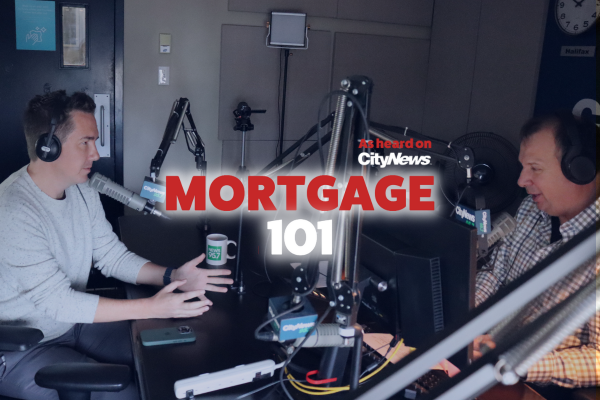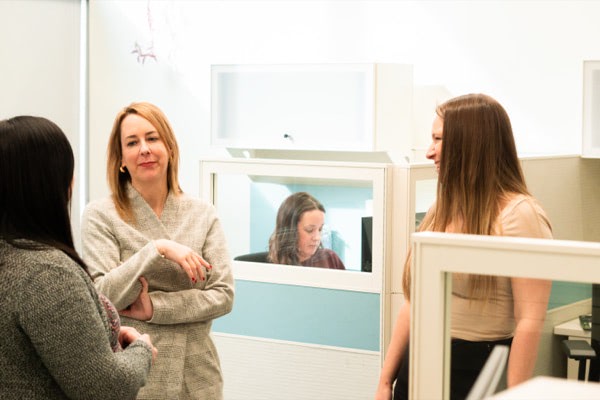Meet Miria Ferguson, our newest member of the Clinton Wilkins Mortgage Team! Miria joins us as an associate mortgage broker

Mortgage 101 – Fraud and Financing | November 30th
On our last segment from our Mortgage 101 live radio show, Clinton Wilkins and Todd Veinotte take more calls and answer their burning questions. They break down how to protect yourself against title fraud, the risks associated with clearing your mortgage and the specific stipulations for financing a tiny home.
Todd Veinotte 00:05
Jeanne, hello.
Jeanie 00:07
Hey, Todd, how are you?
Todd Veinotte 00:09
Well, you?
Registration protects against title fraud
Jeanie 00:11
I’m good. I’ve got a question for Clinton, hey Clinton, I appreciate all the information that you provide on the show. It’s so great to always hear your advice. My question is this. I’ve heard from several people that have told me that it’s not a good idea to clear off your mortgage, and the reasoning they’ve given is, number one if you have no mortgage, then companies won’t insure you. And reason number two, if you have no mortgage that makes it easier for fraudsters to steal your property. Is any of this true? Or is it a good idea to work towards clearing your mortgage?
Clinton Wilkins 00:49
Well, you know, I think paying off the mortgage is okay, but I think having a registration on the property is important. There’s certainly a lot of title fraud that’s happening across this country. And it’s specifically happening to seniors and snowbirds, people will go away, and the fraudsters will come in, and you know, replicate their ID, and then put a charge on their property, then suddenly, the property is in foreclosure. So I think the key is, you can pay off your mortgage, but still have a registration on your property. So maybe at that point, you put a home equity line of credit on there. You don’t need to use it but as long as it’s there, and it’s registered, your title will be protected. Personally, I’ve never heard of insurance company, not insuring someone with a mortgage. So I think that might be a fallacy. But I think protecting the title in terms of title fraud, having a registration on there is going to be really important. We’re also gonna have a guest here on November 30, our final show of this year, from First Canadian title, and she’s going to talk maybe a little bit more about what does title insurance look like? And we can talk maybe a little bit more about title fraud and stuff like that.
Jeanie 01:55
Okay, and so it’s, I guess, it’s, it’s safe to assume that not everyone has that registration, I just thought maybe everyone did.
Clearing your mortgage has risks
Clinton Wilkins 02:03
Certainly, no, a lot of people do not, but a lot of people do own their homes free and clear. But I think when you do own it free and clear, that does open you up to a situation like title fraud. It is very rare here in Nova Scotia. But I can tell you, it’s certainly on the increase in areas like Ontario and BC. And as you know, whatever happens there takes a few years to come down the road, but it will be coming to Nova Scotia. And, you know, we never like to see a person in a situation where, you know, they’ve had, you know, their title stolen, or they’ve had a fraudulent registration. Again, very rare in Nova Scotia, but you can protect yourself, by if your home is free and clear, at least having a home equity line of credit on there, because technically, then the property is tied up. So certainly talk to your unbiased mortgage professional about you know, even putting a registration on there if you do own it free and clear. Or if you’re about to pay off your mortgage, then taking that and turning it into a home equity line of credit. Hopefully that helps.
Clinton Wilkins 03:03
Sound good Jeanie?
Jeanie 03:05
Yes. Sounds great. Thank you so much.
Todd Veinotte 03:07
Okay thanks for the call. 902-405-6000. Got a bit of time to the top of the hour if you’d like to get a question in 902-405-6000. Tracy, hello.
Tracy 03:18
Hello, I just have a quick question for you guys about tiny homes just because I know that’s coming into the community here now.
Clinton Wilkins 03:25
It’s more popular for sure.
Tracy 03:26
And other provinces as it is. Yeah. So what are the stipulations for getting a mortgage for tiny home? Like do you have to own the property? Or is there a specific way that they finance? Is it just done like in our RV loan? I’m just questioning.
Stipulations for financing a tiny home
Clinton Wilkins 03:40
Yeah, there’s there’s a couple of different ways. So the most of the tiny homes that we are seeing are on a foundation. So there are home, but very, very small square footage. So maybe there are like a one bedroom or two bedroom. And typically when we say small square footage, I’m talking like sub 700 square feet, like we had one the other day that was 500 or 495 square feet. And typically those types of properties need to be insured with the Canadian Mortgage and Housing Corporation. So typically, when we’re doing a transaction on a tiny home, we’ll do it as a purchase, but it might not be able to be refinanced down the road. Because really, the whole idea with the tiny home is that they need to have that insurance because that’s providing the lender with an extra layer of protection. It’s basically protecting the loan 100%, especially if they do get the insurance from the Canadian Mortgage Housing Corporation. So the one that I did just recently, the borrower put down 20% but we still insured it with the Canadian Mortgage and Housing Corporation because then it gave the bank the security that if something did go wrong, and they had to foreclose on that property CMHC then would provide all the coverage. And they’re certainly becoming more and more popular. And banks are changing their appetite into you know, lending on tiny homes. But I would say by and large, the types of transactions we’re seeing are a purchase and majority of these purchases are being high ratio insured. Now, let’s say this tiny home is not on a foundation, let’s say it’s on a, like a trailer or it’s on wheels or something like that, that would be financed either like an RV, or it might be financed like a mobile home. And we don’t do those types of financing ourselves. But there are lenders out there that will do it like credit unions and some of the big banks. So if it’s one that’s more like a mobile home or an RV, that would definitely be a transaction that would not be in our purview. But we can certainly point people in the right direction. But the tiny homes that we’re doing are on a foundation.
Tracy 05:40
So you have to have a foundation, in order to have it financed like a mortgage. Are rates, the same kind of way, are they considered high ratio just because it’s a tiny home? Like does that, does it impact rates at all?
Clinton Wilkins 05:52
Well, I think that’s a really good question. If we’re able to get CMHC insurance, you would get the same rate that anybody with CMHC insurance would get. So typically, if you have a high ratio mortgage, you know, someone put down less than 20%. They’re all insured either with Canadian Mortgage Housing Corporation, Sagenor Canada Guarantee. And those are right now at the best rates that we can get in the marketplace. So you actually get a better rate with the insurance, than you would with a normal conventional mortgage. Just because the banks do have that insurance, and they’re able to access a lower cost of funds. So it’s always it’s always having a lower rate when you have the insurance, which I know seems strange. So we have clients that come in and put down 5%, they’re getting a lower rate than customers coming in and putting down 20%.
Tracy 06:39
Okay, so when you buy a tiny home, it is also required that you put 20% down?
Clinton Wilkins 06:43
Not necessarily, no. No, we have done them with 5% down.
Tracy 06:49
Wow.
Clinton Wilkins 06:49
Yep. So if CMHC will insure it, we can do that 5% down for sure. I was just giving the example. This last one we did end up being 20% down, but we still insured it with the Canadian Mortgage and Housing Corporation.
Tracy 07:00
I understand. But then you have, do you paid the deed transfer tax? I guess if you’re gonna own the land –
Clinton Wilkins 07:05
Yeah, if it’s on a foundation, you own the land, there would still be deed transfer tax. So that would that would definitely be a be a thing. And this last one that we did was on their own piece of land.
Tracy 07:15
And if we buy land on its own, and from my understanding, we don’t pay deed transfer, or no, we would pay deed transfer tax, we just wouldn’t pay CMHC fees?
Clinton Wilkins 07:23
You would pay the deed transfer tax on the land. And if you did it as like a turnkey type situation and we did a high ratio mortgage, there were still would be a CMHC premium.
Todd Veinotte 07:32
Okay. Tracey out of time. Hopefully that does it for you. Thank you.
Tracy 07:36
That was great, thank you.
Todd Veinotte 07:37
Okay, great stuff. I had a couple of people we didn’t get to. For that we apologize, but it just speaks to the importance and the interest in all of this stuff, Clinton, right?
Clinton Wilkins 07:46
I know. It’s great. And we’re gonna be back here on November 30th. We have another couple of great guests lined up and we’re gonna be taking your calls, which is awesome. So if we didn’t get to you today, save your question. Or if you didn’t get up the gumption to call us, you can certainly save your question.
Todd Veinotte 07:59
How do people get ahold of you?
Clinton Wilkins 08:00
They can visit us online at teamclinton.ca/radio. We have hundreds of blog posts on there. You can find clips of Todd’s show, and our show, Mortgage 101, lots of great content, you can contact us on there and links to our social media. So certainly check it out. And you know, I thank all the listeners for tuning in. This is our second show of financial literacy month. I think November is so important, and we’re gonna continue pumping out that education.


